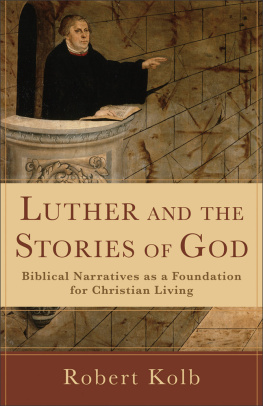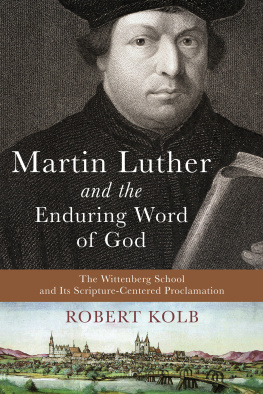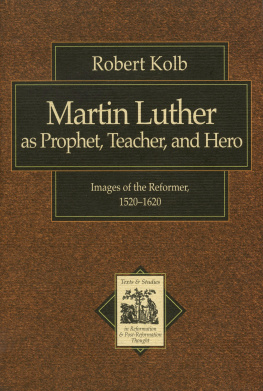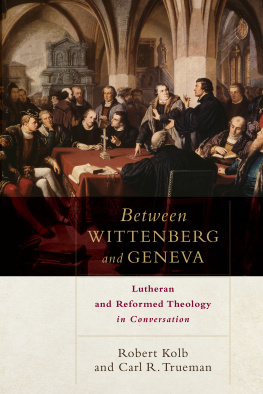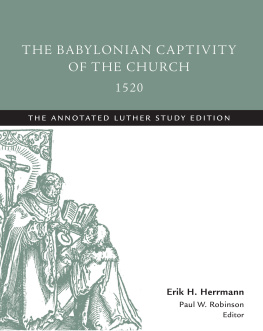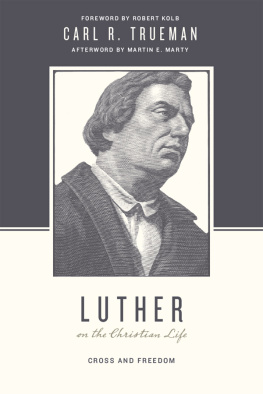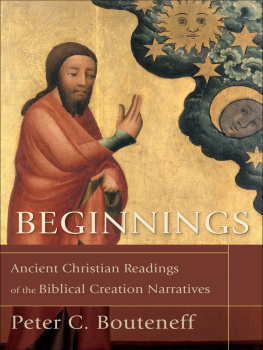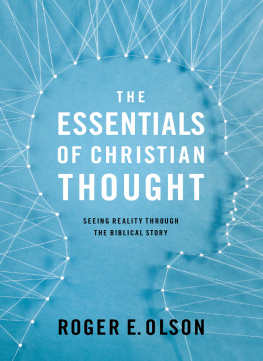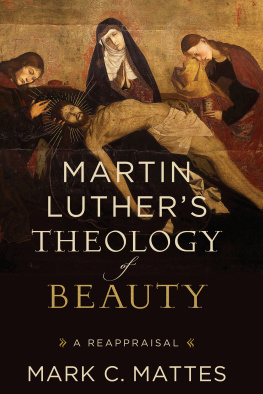Robert Kolb - Luther and the Stories of God: Biblical Narratives as a Foundation for Christian Living
Here you can read online Robert Kolb - Luther and the Stories of God: Biblical Narratives as a Foundation for Christian Living full text of the book (entire story) in english for free. Download pdf and epub, get meaning, cover and reviews about this ebook. year: 2012, publisher: Baker Publishing Group, genre: Religion. Description of the work, (preface) as well as reviews are available. Best literature library LitArk.com created for fans of good reading and offers a wide selection of genres:
Romance novel
Science fiction
Adventure
Detective
Science
History
Home and family
Prose
Art
Politics
Computer
Non-fiction
Religion
Business
Children
Humor
Choose a favorite category and find really read worthwhile books. Enjoy immersion in the world of imagination, feel the emotions of the characters or learn something new for yourself, make an fascinating discovery.
- Book:Luther and the Stories of God: Biblical Narratives as a Foundation for Christian Living
- Author:
- Publisher:Baker Publishing Group
- Genre:
- Year:2012
- Rating:5 / 5
- Favourites:Add to favourites
- Your mark:
- 100
- 1
- 2
- 3
- 4
- 5
Luther and the Stories of God: Biblical Narratives as a Foundation for Christian Living: summary, description and annotation
We offer to read an annotation, description, summary or preface (depends on what the author of the book "Luther and the Stories of God: Biblical Narratives as a Foundation for Christian Living" wrote himself). If you haven't found the necessary information about the book — write in the comments, we will try to find it.
Luther and the Stories of God: Biblical Narratives as a Foundation for Christian Living — read online for free the complete book (whole text) full work
Below is the text of the book, divided by pages. System saving the place of the last page read, allows you to conveniently read the book "Luther and the Stories of God: Biblical Narratives as a Foundation for Christian Living" online for free, without having to search again every time where you left off. Put a bookmark, and you can go to the page where you finished reading at any time.
Font size:
Interval:
Bookmark:

: Luther the Storyteller and His Cultivation of the Christian Life
: Luthers Metanarrative
: Defining the Core of What It Means to Be Human
: Defining the Core of What It Means to Be Human
: Affliction as Part of Daily Life
: Active Obedience in the Sacred Realm
: Luthers Ethic of Callings and Commands
: The Completion of the Christian Life
| ARG | Archiv fr Reformationsgeschichte [journal]. Gtersloh. |
| BoC | The Book of Concord . Edited by Robert Kolb and Timothy J. Wengert. Minneapolis: Fortress, 2000. |
| BSLK | Die Bekenntnisschriften der evangelisch-lutherischen Kirche . 11th ed. Gttingen: Vandenhoeck & Ruprecht, 1992. |
| CP | The Sermons of Martin Luther [the Church Postils]. Edited and translated by John N. Lenker. 8 vols. 1905; Grand Rapids: Baker Book House, 1983. |
| EA2 | Dr. Martin Luthers smmtliche Werke [Erlangen Ausgabe]. Erlangen ed., 2nd. ed. Frankfurt am Main and Erlangen: Heyder & Zimmer, 186285. |
| FS | Festival Sermons of Martin Luther: The Church Postils . Translated by Joel R. Baseley. Dearborn, MI: Mark V, 2005. |
| HP | Sermons of Martin Luther: The House Postil s. Edited and translated by Eugene F. A. Klug. Grand Rapids: Baker Books, 1996. |
| LQ | Lutheran Quarterly . Gettysburg, PA. |
| LuJ | Lutherjahrbuch . Gttingen: Vandenhoeck & Ruprecht. |
| LW | Luthers Works . Edited by Jaroslav Pelikan and Helmut T. Lehmann. St. Louis: Concordia; Philadelphia: Fortress, 195886. |
| TR | Martin Luther. Tischreden [Table Talk]. 6 vols. in WA. |
| TRE | Theologische Realenzyklopdie . Edited by Gerhard Krause and Gerhard Mller. Berlin: de Gruyter, 19772004. |
| WA | D. Martin Luthers Werke [Weimarer Ausgabe]. Weimar: Bhlau, 18831993. |
Luther the Storyteller and His Cultivation of the Christian Life
All books in the entire Scripture are either reports or historical narratives; they offer examples, sometimes of laws, sometimes of the activities of God, and they all teach faith. The Pentateuch, in which the law is comprehended, reveals the origin of the human creature and sin. The prophets identify sin and pray to Christ, who takes sin away. John points to Christ as the Lamb of God. Christ takes away sin and brings salvation.
E arly in his career as reformer, Martin Luther wrote these words as he prepared to preach on Genesis 14 in 1521. By that time a veteran preacher and somewhat seasoned university lecturer, he had already defined the nature of Gods revelation as centered on his actions in the form of speech (heard, or unheard as in Genesis 1) and his mysterious guidance of human and natural events, all embedded in human history, and interpreted authoritatively by the prophets and apostles in the Holy Scriptures. Luther recognized that Gods unfolding plan for his human creatures constituted what today is labeled a metanarrative, a master narrative that makes sense of incorporated specific stories. This metanarrativebeginning with creation and the fall into sin in Genesis, focused on Christs incarnation, death, and resurrection, ending with his return at the end of timeguided and framed the history of Gods people as it was reported in both broad strokes and minute, personal details throughout the Bible.
Luther used several rhetorical forms in his preaching and exegetical lectures to expose the meaning of the text and apply it. Sometimes he presented careful exposition of the biblical text; at other times he employed a catechetical approach, organizing his discourse to teach the truths and applications of the truth he found in a text. But the Wittenberg exegete also believed that God had created human beings to experience reality in the flow of history. Luther believed that the stories constituting this flow reveal something of the larger story of Gods creation and preservation of his world. Therefore the retelling of biblical stories, supplemented on occasion with other stories, both from his own experience and reading and from the experiences of his congregation, enriched his conveying of the biblical text. This volume focuses particularly on Luthers recounting stories as he cultivated the Christian way of living, providing instruction and direction for his hearers and readers participation in the unfolding drama of Gods governance of human history.
Martin Luther as Storyteller
Luther indeed recognized not only the usefulness but also the ambiguity of the biblical stories. In 1532 Conrad Cordatus recorded his mentors observation that the stories of the Old Testament are particularly clear, but to those who read them superficially, they are deadly. To the faithful they are alive. To support this observation, Luther used the rather peculiar example of the resultant childlessness of Jephthah (Judg. 11), who sacrificed his only child to fulfill a vow. Luther contrasted Jephthahs fate with that of Hannah, who received a child, Samuel, as a gift from God (1 Sam. 12).
Fifteen years earlier the same theory of narrative had guided his treatment of biblical texts in his preaching in Wittenberg. Mary and Joseph had not understood what their twelve-year-old had meant when he explained that he had to be about his fathers business. They had despaired of finding him and had questioned Gods love for them. Such examples are very useful for us. We need them to show us how also among the saints, who are Gods children and are above others given Gods favor, weakness nonetheless remains, so they often stray and make mistakes. Sometimes they stumble badly, although not intentionally or willfully, but from weariness and misunderstanding. The apostles had such experiences. These stories teach Gods people to find comfort in God and to cling to his Word.
The biblical accounts of Gods action and the actions of both saints and sinners need to be interpreted and applied within the context of the contemporary proclaimers hearers and readers. With that provision, Luther was convinced that these accounts of human experience and Gods intervention in history are valuable means for demonstrating who God is and what it means to be human. He also was convinced that such stories need to be interpreted within the context of the larger framework of Gods revelationLuthers metanarrative.
Indeed, Luther used a variety of stories to explain his larger vision of Gods revelation of himself and what it means to be human. These include references to experiences from Luthers own life and memory. Such recollections occurred more frequently, to be sure, at the supper table than in the lecture hall or pulpit. His stories also include tales from ancient myths and classical history, as well as from the history of the church, and even from its tradition of the legends of the saints. His narrative depictions of God in action include also the professors own fables, such as scenes from Christs battle against Satan, that have an almost Tolkienesque ring. But in addition, Luther fostered faith and piety from the pulpit and in his exegetical exposition through the retelling of biblical stories. He often imaginatively filled in details in a way he believed was consistent with what was happening in the text, details that provided his hearers and readers with special insight into its significance for their lives.
Luther and the Bible
Although he left few reports of the initial impact that hearing its accounts made upon him, Luther experienced the Bible early in his life. Undoubtedly, he heard its stories first as a child. His student and amanuensis Veit Dietrich recounted the professors supper-table telling of his fascination, while still a boy, with the story of Samuels mother. such a purchase seems unlikely for a younger child. Whatever the age, one of Luthers earliest encounters with Scripture involved a story of Gods calling a servant to the ministry of his Word.
Font size:
Interval:
Bookmark:
Similar books «Luther and the Stories of God: Biblical Narratives as a Foundation for Christian Living»
Look at similar books to Luther and the Stories of God: Biblical Narratives as a Foundation for Christian Living. We have selected literature similar in name and meaning in the hope of providing readers with more options to find new, interesting, not yet read works.
Discussion, reviews of the book Luther and the Stories of God: Biblical Narratives as a Foundation for Christian Living and just readers' own opinions. Leave your comments, write what you think about the work, its meaning or the main characters. Specify what exactly you liked and what you didn't like, and why you think so.

